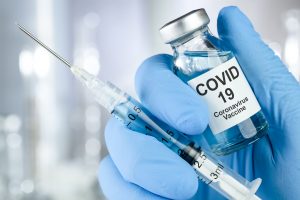Hong Kong is ramping up efforts to inoculate its population using a new tactic – by offering incentives to those willing to take the jab.
High levels of vaccine hesitancy and deteriorating public trust in authorities have so far crippled the city’s COVID-19 vaccination uptake. As of April 15, approximately 8.6 percent of Hong Kong’s population of 7.5 million people have received their first dose, and about 4.4 percent have received their second, government statistics show. Experts have suggested that a vaccination rate of at least 70 percent is required for herd immunity.
This week, the government announced it would consider easing social distancing requirements for those who have taken the vaccine, which would allow inoculated individuals to form “vaccine bubbles” and be exempt from certain restrictions in restaurants, bars, and other services. Fully vaccinated people will also be able to participate in travel bubbles and visit nursing homes. The city’s current coronavirus restrictions will remain in place until April 28.
Chief Executive Carrie Lam also declared that for restrictions to ease, customers will have to use the government’s coronavirus-tracing app – which has been the subject of widespread scrutiny due to public concerns over data privacy – and restaurants and bars should ensure that all staff members have received at least one jab.
The announcements led to a jump in online bookings, but led many to question the government’s approach. Critics argue that the incentives place pressure on individuals who are hesitant to take up the vaccine due to existing health conditions, and the requirements put an undue burden on business owners in the service sector, who cannot force employees to take the vaccine and do not want to offend customers.
Following the move, the city’s Equal Opportunities Commission warned employers that they risk breaching discrimination laws if they fire employees for refusing to take the jab. “Since not everyone is suitable for Covid-19 vaccinations, when imposing different treatments, employers and service providers should… consider the needs of people who are not suitable for vaccination, and consider making other appropriate arrangements,” the EOC said in a statement on April 14.
On April 15, the government further expanded the inoculation program to allow those under the age of 30 to begin booking vaccinations – opening it up to some 1.08 million more people. Officials also announced that community vaccination centers administering the European–manufactured Pfizer-BioNTech vaccine will close in late September, reportedly due to limited supplies and the challenges of storing the vaccine.
The city will not be acquiring a third type of vaccine this year, authorities said, adding that its order for the AstraZeneca vaccine developed jointly with Oxford University has been temporarily suspended.
Hong Kongers have reacted to the government’s vaccine rollout plan with skepticism since it launched earlier this year. In February, many expressed concerns over a rushed decision by Hong Kong experts advising the government to approve China’s Sinovac vaccine – a decision made without waiting for an endorsement from the World Health Organization and or more data from the firm producing the vaccine. Last month, the city also temporarily suspended use of the Pfizer-BioNTech vaccine due to packaging defects.

































